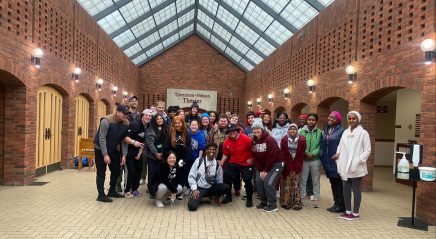Editor’s note: May is Mental Health Awareness Month. Read the ELCA’s social message “The Body of Christ and Mental Illness.”
Religion and mental health treatment are often viewed as opposites. Some religious people believe that treatment for mental health is unnecessary—God alone heals. Others believe in the benefits of treatment but see no place for religion in it—mental health and spiritual health are separate. As a queer person and someone who deals with religious anxiety despite years of separation from the nondenominational church that hurt me, I know the damage that harmful theology can inflict on someone’s mental health. Nevertheless, I know that for those who are religious, faith has a place in healing mental health, both in clinical treatment and in the building of supportive communities.
Spiritual healing as part of clinical treatment can be as casual as finding a therapist with the same faith background as yours and openly discussing your faith in sessions, as I did. There is also a small and growing field of clinical mental health practice that specifically and intentionally adds a spiritual component.
The combination works: Sharon E. Bowland, one of my professors at the University of North Texas and a licensed clinical social worker, conducted a study on spiritual intervention with older women who had survived interpersonal trauma. During the first session, participants discussed their spiritual histories in relation to their traumatic experiences. In the next 10 sessions, participants discussed spiritual needs, spiritual gifts, “negative coping” (viewing God as having punished or abandoned them), forgiveness and places of hope in their lives. They also developed spiritual recovery action plans and identified recovery strategies such as prayer, music, changing congregations, reading new translations of sacred texts and joining spiritual support groups. In contrast to the control group, whose treatment included no spiritual component, these women experienced meaningful reductions to their depression, anxiety and post-traumatic stress symptoms.
Belonging, sharing, healing
I joined the Denton chapter of Lutheran Campus Ministry (LCM) the very first week of my freshman year. I intended to try out every campus ministry, but because the Lutherans advertised themselves quite clearly as open and affirming, LCM seemed a good place to start. That night I met a woman pastor for the first time.
The church I grew up in doesn’t believe that God calls women to ministry. In fact, a week before I joined LCM, an old family friend called my calling “misguided.” The ELCA, however, recently celebrated 50 years of ordaining women and 10 years of ordaining my queer siblings in Christ.
During dinner, the Denton chapter did a weekly check-in, each of us sharing our highs and lows. I noticed that, every week, mental health was part of that conversation. This simple practice of reflection positively affected my overall mental health. Now, Bible study isn’t therapy and shouldn’t be treated as such, but it can be a support group—it was for me—and that’s just as important in mental health treatment.
According to the National Alliance on Mental Illness, 1 in every 5 Americans lives with mental illness. Not everyone needs or can afford clinical treatment such as therapy or medication, but we can all benefit from a support group that permits us to talk about struggles, practice reflection, share coping mechanisms and celebrate. This is where LCM can step in.
Mental health problems are common on college campuses. According to the American College Health Association, 32% of students received treatment from a professional for a mental health condition in spring 2019—and that number accounts for only those who could afford treatment. Of the students surveyed, 46% said that in the past year, they’d felt so depressed they had trouble functioning, and 66% reported overwhelming anxiety in that same time.
Accessible and affordable mental health support is a real need on campuses, and campus ministries can meet that need, whether through formal or informal means. LCM provided me with a safe, affirming place where I could unpack harmful theology and build something healthier. I pray that more students can find belonging and healing through LCM.










